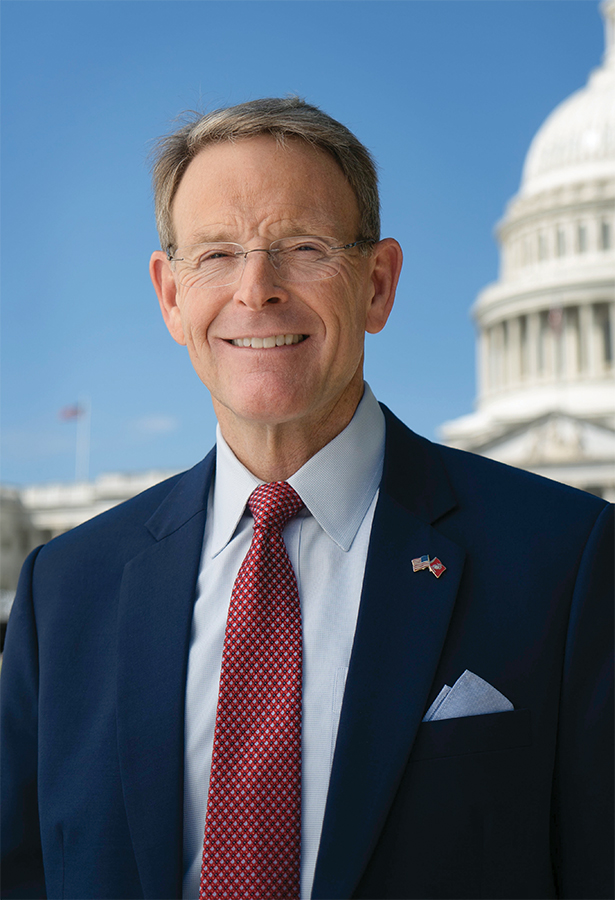As President-elect Donald Trump’s second term officially begins, following his Jan. 20 inauguration, the 77 million people who voted for him will be looking for change. Many in the media have described November’s election as a referendum on several issues: a vote against “wokeness” run amok, a protest against high inflation, a renunciation of failed border policy.
A host of special interest groups have cast their hopes and dreams for what might be accomplished. Evangelicals, who voted heavily for the Republican ticket, have hopes that a second Trump term might mean more constitutionalist judges appointed, religious liberty protections preserved, and federal agencies stopped from advancing left-wing social policies.

But amid the political optimism of the moment, Tony Perkins has a caveat for followers of Jesus Christ, who have an eternal hope beyond this earth.
“At the end of the day, the government really is protecting our freedom and our ability to do the work that only the church can do,” Perkins said. “And that is to change the hearts and minds of people through the truth of the Gospel of Jesus Christ.”
Perkins, president of the Family Research Council, and John Stonestreet, president of The Colson Center—told Decision that they believe an opportune moment has been given to protect religious freedom, lessen evil and advance the public good.
While many people may put their hopes in a new White House regime, or seethe in anger over it, Christians must have a distinctly Biblical perspective.
“We can’t feel like our responsibility ended when we cast our vote on Nov. 5. That somehow we can delegate this responsibility to the government. We cannot. We need godly men and women in government,” said Perkins, noting that good government stays out of the way so the church is unhindered in doing the work God has called it to do. “Now, the real work of changing hearts and minds and retaking the moral ground in our country begins.”
Perkins says he was surprised not that Trump won, but by how decisive the victory was. He also believes Vice President Kamala Harris and her campaign emphasized abortion and radical LGBTQ ideology to their detriment.
SANCTITY OF HUMAN LIFE
“She was running with her No. 1 issue as abortion,” Perkins said. “That’s all she talked about. And I think more women were concerned about feeding their families, not aborting them.”
Stonestreet agrees with that assessment. “The Democratic Party has become the most violently and aggressively pro-abortion political group that we’ve ever seen.”

But, Perkins and Stonestreet acknowledge, pro-life Christians will face challenges because of a new GOP platform that removed strong pro-life language.
“There was a political shift [in 2024] on the issue of life that we have to reckon with,” said Stonestreet, alluding to the watered-down GOP platform. “We have to reckon with the fact that the Republican Party is now the Democrats of the 1990s on abortion. Just because the Democratic Party is worse on this issue doesn’t mean the Republican Party is OK. Essentially, the Republican platform argues for ‘safe, legal and rare,’ which was the Clinton motto of the ’90s.”
Perkins added: “Trump’s numbers were a little softer with evangelicals than last time. I think part of that was that there was less emphasis in the GOP on the life issue and less clarity in the platform—although it was still a contrast with the Democrats.”
On the other hand, Perkins said, “Harris drove a lot of pro-life voters out to the polls” to vote against her.
“She accused [Trump] of being staunch, and she wanted abortion until birth.”
Perkins said he has spoken with Trump about the GOP’s softened abortion stance. “While I disagree, I understand the president’s position.” Perkins points out that there is still much to be done at the federal level. “Pro-life groups must continue to have conversations and work with Congress on this.”
Leaving the federal government to continue its practices of the last four years, Perkins said, would mean allowing the FDA to continue mailing abortion pills even to states with strong pro-life laws. “That’s a federal role that would need to be addressed.”
“Planned Parenthood funding needs to be cut,” Perkins said. “There’s plenty of excess to cut. Just getting the federal government out of the promotion of abortion is going to be a step in the right direction.”
Stonestreet said that on the state level, Christians have a tall task. In seven of 10 states where abortion initiatives were on the ballot, voters chose to expand abortion access, including Stonestreet’s home state, Colorado. In one state, Florida, a proposal to write abortion rights into the state constitution was barely defeated. The ballot required 60% of voters to approve the question: 57% voted to expand abortion, falling short but outpacing the 53% of pro-life voters who opposed it.
“We just staved off defeat in Florida, and we’ve got to have the cold, hard facts on that. It is not good,” Stonestreet said. “State by state, we are going to need to figure out just how committed we are to our position.”
LGBTQ ACTIVISM
Some observers have said Trump’s election represents not merely a rejection of left-wing activism, but transgender activism specifically.
As Republican voters counted their blessings post-election, some Democrat strategists wondered if their party’s devotion to radical causes was a liability with mainstream voters.
The Biden administration was quick to embrace the extreme elements of the LGBTQ agenda—especially in pushing gender ideology and by opposing state bans on transition procedures for minors. The administration set the tone for its term by announcing it was nominating Rachel Levine, a trans-identifying biological male, as assistant secretary of Health and Human Services, before Biden took the oath of office.
Stonestreet said in the last 12 to 16 months, there has been a “great backpedaling” on the transgender issue as even secular observers have begun to question the stringent adherence to trans ideology that radical activists are demanding. Meanwhile, leading European countries have begun to outlaw or at least discourage transitioning for minors because of health concerns. “On the cultural level, about the only thing that was still propping up the trans agenda was Biden-Harris administration officials,” Stonestreet observed.
During the last four years, the Biden administration drafted a radical rewrite of Title IX education law by redefining the term sex to include sexual orientation and gender identity. The administration also imposed a rule requiring states to place LGBTQ-identifying foster children with families willing to affirm their LGBTQ identity, and rescinded conscience waivers for faith-based adoption and foster care agencies.
On the positive side, Stonestreet noted, Trump has promised to issue an executive order seeking to protect women’s sports in publicly funded institutions from the encroachment of biological males.
PUBLIC DISTRUST
For most evangelicals, the right of Israel to defend itself and a belief in the foreign policy doctrine of “peace through strength” led to broad support for the Trump-Vance ticket. The feverish antisemitism seen on college campuses and elsewhere over the last 15 months also mobilized other subgroups of voters to oppose the Harris-Walz ticket for its tepid response to groups spouting antisemitic rhetoric.
There were also messages from the White House that didn’t seem to ring true with voters about the economic realities everyday people face, Stonestreet noted.
“There was a great bit of effort from media outlets and certain personalities to tell us that ‘The economy is great. Why is everyone so worried?’ And so on. And people just didn’t believe it. Why? Because they’re buying eggs. Why am I spending this much for eggs?
“But that lack of credibility points to something even more serious, and that is that there was a serious trust crisis. The political messaging about the state of the economy and a host of other issues wasn’t believable.
“As Christians—people who know truth and not only truth, but Truth as a person—we should be those who can contribute to the rebuilding of trust.” Also, Christian people must have the courage in a world of hostile, godless cultural pressure to “live not by lies,” said Stonestreet, an allusion to the words of Aleksandr Solzhenitsyn, the Russian writer who was imprisoned by the Communists.
The nation has seen a “spiral of silence”—especially on the issue of gender and sexuality pertaining to children—because Christians and even some pastors have been too timid to speak up, he said.
“But when one person speaks up, somebody else is willing to speak up and the social pressure is alleviated by an act of courage. And I do think that we have seen this play itself out in real life recently” with the pushback against radical ideologies.
“I love the line: ‘We have to be ruthless with ideas and gentle with people,’” Stonestreet added. “And I think too many churches want to be gentle with ideas and gentle with people. It’s going to take a lot of work, and I’m not sure the typical discipleship experience most Christians have is preparing them for that necessity.” ©2024 BGEA
